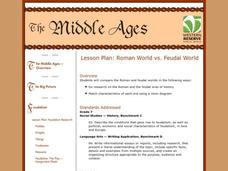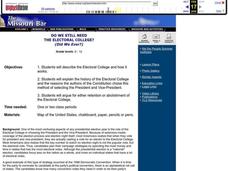Curated OER
World Governments and Mapping Activity
Here you will find maps, great informational text, and vital information on political systems and government. The slide show provides material on democratic and nondemocratic systems of government as well as a map activity intended to...
Curated OER
The First World War
High schoolers examine the process and effects of World War I on different segments of the population, beyond the political, diplomatic and military framework of the war. They analyze the memoirs of soldiers, read poetry of the time, and...
Curated OER
Defined: The Different Types of Government
The world is a big place, so it only stands to reason that different forms of government exist. Democracy, autocracy, oligarch, monarch, and dictatorship are all defined. An extensive explanation of US government system is also included....
iCivics
Limiting Government
While this lesson includes several nice worksheets to identify and discuss the various limits on government (i.e. a constitution, the rule of law, separation of powers, consent of the governed, etc.), its main value lies in a case study...
Curated OER
World War 1: A New Kind of War
Guide reading and enhance your students' understanding of WWI with this rich presentation. Topics covered are warfare, weapons, technology, government actions, women in war, and the effects of war on the home front and around the world....
Delegation of the European Union to the United States
Structure of Government within the EU
The political system of the European Union is historically unique and has been constantly evolving. To better understand the structure of the EU, class members compare the EU's branches to those of the United States Federal Government.
Prestwick House
Brave New World
Readers of Brave New World demonstrate what they remember of events in Aldous Huxley's dystopian novel by completing a 26-clue crossword puzzle.
Curated OER
Government Lesson Plan: Lesson Plan 12
Students investigate various political systems around the world. They complete a chart that compares the U.S. political system with other nations' governments, conduct research on a selected nation, and present an oral report.
Council for Economic Education
Government Spending: Why Do We Spend the Way We Do?
High schoolers examine the categories for federal spending using the internet to locate them. They create a list of expenditures noting them as government purchases or transfer payments. They analyze the patterns of spending during the...
Curated OER
Who's The Boss?
Upper elementary and middle schoolers research and analyze some different types of governments. Democracies, Monarchies, and Dictatorships are some of the types that are looked at. Learners use the Internet to gather information that...
Curated OER
The Three Branches of Government
Students complete a unit on the three branches of government. They compare/contrast the three branches of government, write a letter or e-mail to an executive in the Federal Government, and develop outlines for historical documents.
Curated OER
Photographs of the 369th Infantry and African Americans during World War I
Students engage in a discussion regarding images of war we see, how quickly do we see them, and how they affect us? They view and analyze war photographs taken during World War I.
iCivics
Step Five: All about Public Policy
Public policy is important to understand because it affects everyone. The resource tells middle schoolers how the government uses policy to accomplish goals in the administration. It includes a reading, true or false worksheet, a...
Curated OER
The Legacy of Ancient Greece and Rome
Where did the inspiration for the US government system come from? From the ancient Greeks and Romans, of course. Scholars define nine terms relating to Greek and Roman government, complete a graphic organizer, and list the greatest...
Northeastern Educational Television of Ohio, Inc.
Roman World vs. Feudal World
Young historians compare the major features of the Roman and feudal worlds, such as religion, social hierarchy, and political tenets, using online resources and group discussion.
Curated OER
US Government: The Checks and Balances System of the US Constitution
Students examine the responsibilities of the 3 branches of U.S. government. In this checks and balances lesson, students identify the powers of the legislative, executive, and judicial branches of government. Students share examples of...
Big History Project
Human Migration Patterns II
While humans have always been on the move, the period between 1400 and 1800 saw vast migrations of people between the East and the West. These migrations—whether through slavery or a desire to colonize new lands—shaped the modern world....
Polk County Public Schools
The Blame Game for the Loss at Pearl Harbor
Known as the day that will live in infamy, the attack on Pearl Harbor in 1941 was a shock to all. But why was the United States unprepared on that December morning? Study a series of primary sources in a document-based question that...
Curated OER
The Unseen Army: Conscientious Objectors During World War II
Learners study World War II and why it was called "the Good War". In this World War II lesson high schoolers identify the different kinds of conscientious objectors.
Curated OER
Chapter 26 – World War II
In this World War II worksheet, students read assigned textbook pages regarding the war and respond to 104 short answer questions.
Curated OER
World War II Erupts Chapter Review
In this World War II worksheet, pupils review a chapter as they write 10 vocabulary words that match 10 descriptions, eliminate 4 false sentences, and identify 2 themes from the history of the World War II era.
Curated OER
"A Costly Prosperity", South Carolina during World War II
Eleventh graders study the history of South Carolina during World War II. In this American History lesson, 11th graders analyze the economic growth of this state through primary sources. Students interpret many different...
Curated OER
Comparing World Religions
Sixth graders participate in a activity of comparing the religions of the world. They conduct research using the essential questions provided in the activity. There is a rubric for the writing assignment for assessment.
Curated OER
Do We Still Need the Electoral College?
One of the most confusing aspects of any presidential election year is the role of the Electoral College. Learners read a bit about how the Electoral College works and then they hold a mock election in their classroom. They'll redraw a...

























